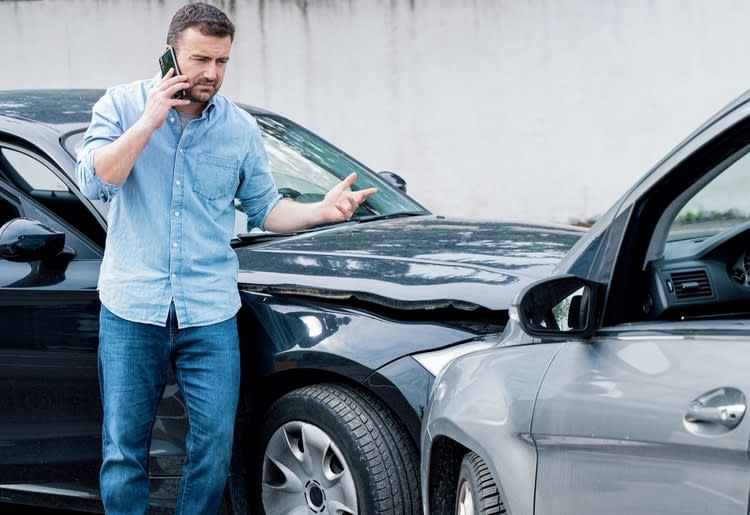
Car accidents happen instantly, but their aftermath can last for days, weeks, or even months. Whether it's a minor fender-bender or a serious collision, knowing exactly what to do if you get in a car accident can significantly affect your safety, legal protection, and financial recovery.
Before we discuss the specifics, compare our best car insurance providers to ensure you're properly covered should you ever encounter this unfortunate situation.
Key Takeaways
Check for injuries and move to a safe location before taking any other steps.
Take photos, gather witness information, and exchange complete details with all parties.
Notify the police and your insurance company as soon as possible after the accident.
Even seemingly minor accidents can cause injuries with delayed symptoms.
Immediate Steps to Take If You Get in a Car Accident
Your immediate response after an accident significantly impacts the outcome. Here’s a breakdown of what to do in those critical first moments:
Check for Injuries
Your top priority is to ensure everyone's safety. Begin by assessing yourself for injuries, then check on passengers in your vehicle and the occupants of any other cars involved. Remember that adrenaline can mask pain, so be thorough.
Even seemingly minor accidents can cause injuries that aren't immediately apparent. If anyone is hurt, call for emergency medical assistance immediately.
Move Vehicles (If Safe)
If your vehicle is drivable and no serious injuries require immediate attention, move it out of the traffic flow to a safe location, such as the shoulder of the road or a nearby parking lot.
Turn on your hazard lights to alert other drivers to the situation. If the vehicles cannot be moved safely or have serious injuries, leave them where they are.
Ensure that you and any other involved parties are in a safe location away from traffic. Call your insurance provider for immovable vehicles and request a tow truck, or call a towing company directly.
When to Call 911
Call 911 immediately if:
Anyone is injured
Vehicles are blocking traffic and cannot be safely moved
There appears to be more than $1,000-$2,000 in damage (varies by state)
One driver seems impaired by alcohol or drugs
Any driver leaves the scene without providing information
Essential Information to Collect After an Accident
Driver Exchange Details
Exchange the following information with all drivers involved:
Full name and contact information
Driver's license number
License plate number
Insurance company and policy number
Vehicle make, model, and year
Documentation Checklist
- Photographs: Take photos of all vehicles involved, capturing damage from multiple angles. Photograph the accident scene, including road conditions, weather, and relevant signage. Also, photograph any visible injuries sustained by yourself or others.
- Videos: In addition to photos, recording videos of the scene can help insurance providers understand the nature of the accident and the damage involved.
- Notes: Record the accident's time, date, and exact location. Make notes of anything you remember about the accident, including the sequence of events.
- Police information: Record the names and badge numbers of the responding police officers.
Witness Information
Get the contact information (names and phone numbers) from any witnesses to the accident. An unbiased witness account can be invaluable when dealing with insurance claims or legal matters. Ask witnesses if they would be willing to provide a brief statement about what they saw.
Contacting Authorities After a Car Accident
- Police report: When police arrive, provide a factual account of what happened without speculating or admitting fault. Request a copy of the police report or information on getting it later. This document is crucial for insurance claims.
- When the police don't respond: In some areas, police may not respond to minor accidents without injuries. If this happens, visit the nearest police station to file a report or complete one online if your state permits it. Many insurance companies require a police report for claims.
- Your legal obligations: Most states legally require you to report accidents that result in injury or property damage above a certain threshold. Failure to report can result in license suspension or other penalties.
What to Do If You Get in a Car Accident with Injuries
Medical Attention Priorities
Seek medical attention promptly, even if you feel fine. Some serious injuries, like internal bleeding or concussions, may not show symptoms immediately. Always prioritize health over other post-accident concerns.
Delayed Symptoms to Watch For
Monitor yourself for delayed symptoms in the days following an accident:
Headaches or dizziness
Neck or shoulder pain
Back pain
Numbness or tingling
Memory problems
Mood changes
Sleep disturbances
Medical Documentation
Keep detailed records of all medical visits, treatments, medications, and expenses related to the accident. Document how your injuries affect your daily life, including your ability to work, perform household tasks, or participate in leisure activities.
This documentation is essential for insurance claims and potential legal action.
Starting the Insurance Process After an Accident
Report the Accident
Report the accident to your insurance company as soon as possible, regardless of who was at fault. Delays in reporting can complicate the claims process and may even void your coverage under some policies. Most insurers offer 24/7 claims reporting services by phone or online.
Claim Filing Steps
When filing a claim, be prepared to provide the following information:
All collected information about the accident, including the date, time, and location
Contact information for all involved parties and witnesses
Photos and/or videos of the accident scene and vehicle damage
A copy of the police report
A detailed description of the accident and the resulting damage
Keep a record of all communications with insurance representatives, including dates, times, and the names of the individuals you spoke with. You can write this down in a physical or digital notepad or text document. Ask about the timeline for processing your claim and what to expect.
When to Contact Your Agent vs. Claims Department
Contact your insurance agent for guidance on your policy coverage and the claims process in general. Work directly with the claims department for specific questions about your claim or to submit documentation. The claims department specializes in processing and settling claims.
Handling Vehicle Damage After a Car Accident
- Towing: If your vehicle requires towing, check your insurance policy to see if towing services are covered. Many policies include towing to a repair facility within a certain distance. Be aware of your coverage limits to avoid unnecessary out-of-pocket expenses.
- Choose a repair shop: You typically have the right to choose the repair shop where your vehicle is repaired. Your insurance company may have preferred providers that offer certain guarantees or streamlined processes, but you are generally not obligated to use them. Get estimates from multiple repair shops to ensure you're getting a fair price.
- Rental car coverage: If your policy includes rental car coverage, ask your insurance representative how to access this benefit. Understand the daily and total coverage limits and how long the coverage lasts while your vehicle is being repaired.
What to Do if the Other Driver is Uninsured
It's a stressful thought, but what happens if the other driver doesn't have insurance or their coverage isn't enough to cover all the damages? Here are your options:
If you have uninsured/underinsured motorist coverage, file a claim with your own insurance.
Use collision coverage for your vehicle damage (subject to your deductible).
Pursue the other driver personally through legal action.
- Documentation needs: Document everything meticulously when dealing with an uninsured driver. Your insurance company will need comprehensive evidence to process your claim without the other driver's insurance involvement.
- Legal considerations: Consult an attorney if you're dealing with an uninsured driver, especially if you've sustained injuries. Many attorneys offer free initial consultations to evaluate your case.
Long-Term Steps After Getting in a Car Accident
- Follow-up appointments: If you were injured, attend all recommended medical follow-up appointments. Proper treatment and documentation of your recovery are essential for your health and ongoing claims.
- Insurance rate impacts: Understand how the accident might affect your insurance rates. Not all accidents result in rate increases, especially if you were not at fault or if you have accident forgiveness benefits.
Consider seeking professional help from an attorney or financial advisor if:
You've sustained serious injuries.
The fault for the accident is disputed.
The insurance company is delaying or denying your claim.
You're facing large medical bills or extended time off work.
The accident involved a commercial vehicle or a government entity.
The other motorist is at fault and is uninsured.
Bottom Line: Crashes Happen to the Best of Us
Dealing with a car accident is challenging, but preparedness makes all the difference. Prioritize safety, document thoroughly, and report promptly to authorities and your insurer. Never skip medical evaluation, and know your rights throughout the process.
Following these steps will help you navigate the aftermath with confidence. Review this guide periodically to internalize these actions. Your best protection begins before any incident occurs—by switching car insurance to a provider that offers the right coverage for your specific needs.

